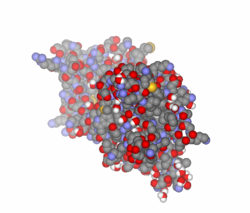crabsallover highlights, key points, comments / links.
In mice on Intermittent Fasting (IF), Mark P. Mattson found that 'sporadic bouts of hunger trigger new neurons to grow'. 'Why should a brain cell generate new cells when you stop feeding it?' asked Michael Mosley of Mark Mattson (5.30s) :- In evolutionary terms, if when you are hungry, it is good to increase your cognitive ability as this could give a survival advantage eg food, predator and hazard locations. In mice, Mattson found that new brain cells [in the hippocampus] grow more than on restricted calorie diet.
But this is just one researcher with trials on mice. Was this research published in a peer reviewed journal? Has his research been repeated in other labs? We do not know whether this growth of brain cells will happen in humans.
Mark P Mattson said (4.10s) that the evidence was 'very good' to 'excellent' that 'Intermittent Fasting IF could reduce the risk of brain diseases in people like Michael Mosley.'
In human terms, putting genetically modified, Alzheimers susceptible mice, on IF means that they develop Alzheimers at 80 rather than at 50 years. Mice on IF diet have increased production of Brain Derived Neurotrophic Factor (BDNF - wikipedia) which stimulates stem cells to turn into new nerve cells in the hippocampus, a part of the brain essential for learning and memory. Research on humans on IF diets, may show, using MRI, that hippocampi size changes. When people exercise (eg walking) the hippocampus size can increase (1). Regular walkers have brains that in MRI scans look, on average, two years younger than the brains of those who are sedentary. (Ref: Michael Mosley & Mimi Spencer, 'The fast diet, The simple secret of Intermittent Fasting: Lose weight, stay healthy, live longer', pub. January 2013 by Short books, pages 44-48)
(1) Erickson, KI; Voss, MW et al, Salk Institute, CA, USA. 'Exercise training increases size of hippocampus and improves memory'. Proceedings of the National Academy of Science USA, January 2011
In mice on Intermittent Fasting (IF), Mark P. Mattson found that 'sporadic bouts of hunger trigger new neurons to grow'. 'Why should a brain cell generate new cells when you stop feeding it?' asked Michael Mosley of Mark Mattson (5.30s) :- In evolutionary terms, if when you are hungry, it is good to increase your cognitive ability as this could give a survival advantage eg food, predator and hazard locations. In mice, Mattson found that new brain cells [in the hippocampus] grow more than on restricted calorie diet.
But this is just one researcher with trials on mice. Was this research published in a peer reviewed journal? Has his research been repeated in other labs? We do not know whether this growth of brain cells will happen in humans.
Mark P Mattson said (4.10s) that the evidence was 'very good' to 'excellent' that 'Intermittent Fasting IF could reduce the risk of brain diseases in people like Michael Mosley.'
 |
| Brain-derived neurotrophic factor |
(1) Erickson, KI; Voss, MW et al, Salk Institute, CA, USA. 'Exercise training increases size of hippocampus and improves memory'. Proceedings of the National Academy of Science USA, January 2011
5-2 Fasting - Excerpts from Michael Mosley's Horizon 'Eat, Fast and Live Longer' from Jon Brewerton on Vimeo.
Michael Mosley (pg 49 in above book) took the cognitive test http://cognitivefun.net/test/2 - the Stroop Test before and after starting the IF and found, purely anecdotally, that his memory had improved.
What is the evidence intermittent fasting prevents cognitive decline?
It seems that all of the studies on the supposed protective effects of IF against conditions that can cause a decline in cognitive function (such as dementia or Alzheimer’s disease) involve animals.
For example, a 2006 study (PDF, 843.1Kb) involved mice that had been genetically engineered to develop changes in brain tissue similar to those seen in people with Alzheimer’s disease.
Mice on an IF diet appeared to experience a slower rate of cognitive decline than mice on a normal diet (cognitive function was assessed using a water maze test).
While the results of these animals tests are certainly intriguing, animal studies have inherent limitations. We can never be sure that the results will be applicable in humans.
Halagappa VKM, Guo Z, Pearson M, et al. Intermittent fasting and caloric restriction ameliorate age-related behavioral deficits in the triple-transgenic mouse model of Alzheimer's disease (PDF, 843.1Kb). Neurobiology of Disease. Published online January 13 2007
Links to the science
Halagappa VKM, Guo Z, Pearson M, et al. Intermittent fasting and caloric restriction ameliorate age-related behavioral deficits in the triple-transgenic mouse model of Alzheimer's disease (PDF, 843.1Kb). Neurobiology of Disease. Published online January 13 2007

No comments:
Post a Comment